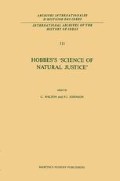Abstract
Characteristically Hobbes defines a topic and then negates it by its opposite, and in doing so creates contradictories, not just contraries. The invariable result is that he cannot cope with the development of the topic without raising problems of interpretation both for himself and for his critical readers. My primary intent here is to point to a number of these contradictories and to show that in coming to terms with the problems of politics he is constrained to transform contradictories into contraries. Secondly, I wish to show how Hobbes’s style of dealing with these matters lends itself to a variety of incompatible scholarly interpretations, which, though textually grounded, produce endless controversy. Prior to discussing the question of the use of the excluded middle in his philosophy, I shall note something of the range of interpretations scholars have made of his theory of man and politics. I conclude by showing the one-sidedness of commentators’ interpretations that fail to acknowledge the distinction between contraries and contradictories as they appear in his basic philosophy.
Access this chapter
Tax calculation will be finalised at checkout
Purchases are for personal use only
Preview
Unable to display preview. Download preview PDF.
Notes
I have addressed myself to a number of these issues in ‘On Hobbes’s Humanism’, in Craig Walton and John P. Anton (eds.), Philosophy and the Civilizing Arts, Essay’s Presented to Herbert W. Schneider on His Eightienth Birthday, (Athens, Ohio: University Press, 1974), pp. 89–102.
Cf. on this score, Keith Thomas, ‘The Social Origins of Hobbes’s Political Thought’, in K.C. Brown (ed.), Hobbes Studies, (Cambridge, Mass.: Harvard University Press, 1965).
Author information
Authors and Affiliations
Editor information
Editors and Affiliations
Rights and permissions
Copyright information
© 1987 Martinus Nijhoff Publishers (Kluwer Academic Publishers), Dordrecht
About this chapter
Cite this chapter
Morris, B. (1987). Hobbes’s Entanglement with the Excluded Middle in his Theory of Man and Politics. In: Walton, C., Johnson, P.J. (eds) Hobbes’s ‘Science of Natural Justice’. Archives Internationales D’histoire des Idées/International Archives of the History of Ideas, vol 111. Springer, Dordrecht. https://doi.org/10.1007/978-94-009-3485-6_6
Download citation
DOI: https://doi.org/10.1007/978-94-009-3485-6_6
Publisher Name: Springer, Dordrecht
Print ISBN: 978-94-010-8060-6
Online ISBN: 978-94-009-3485-6
eBook Packages: Springer Book Archive

